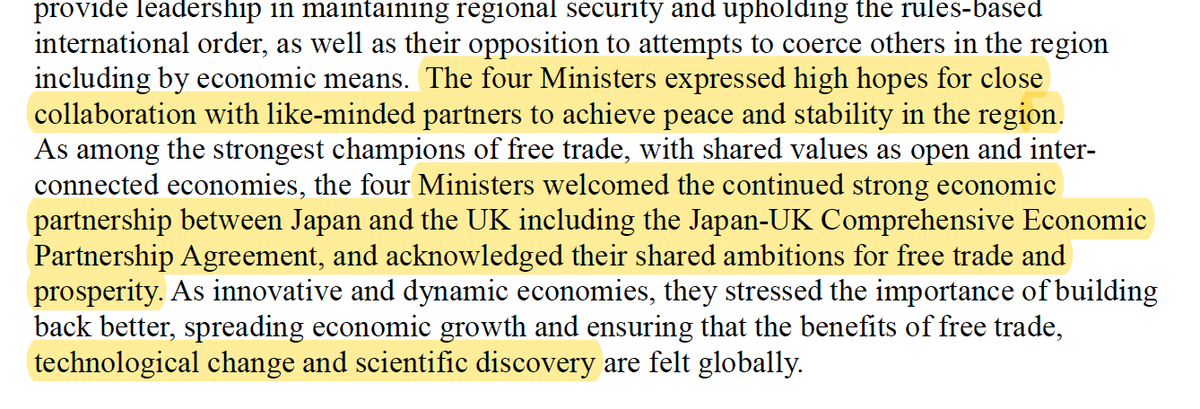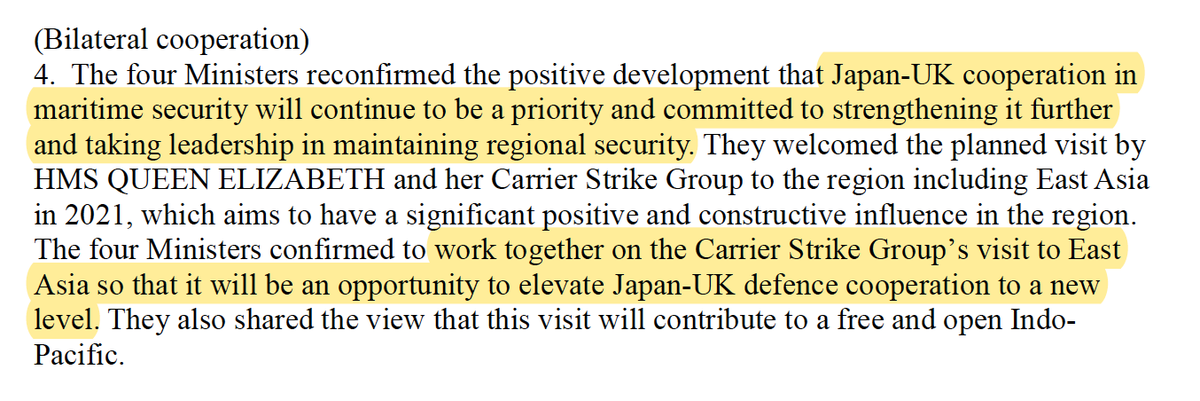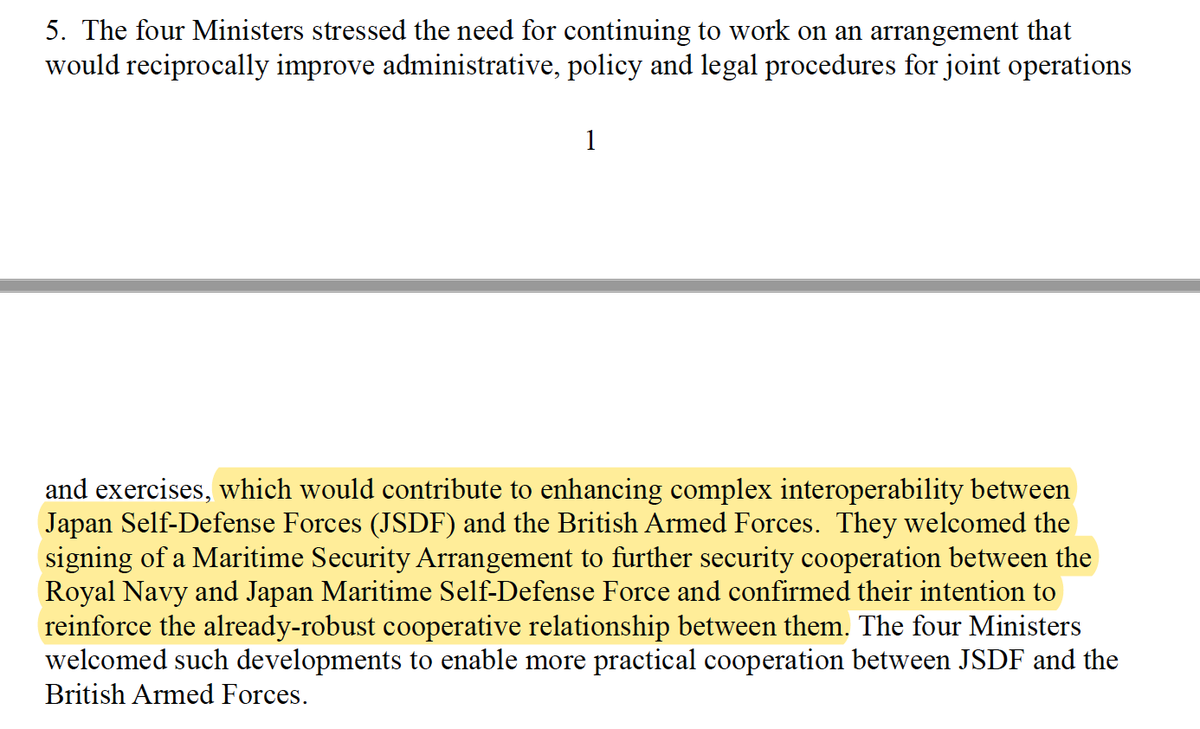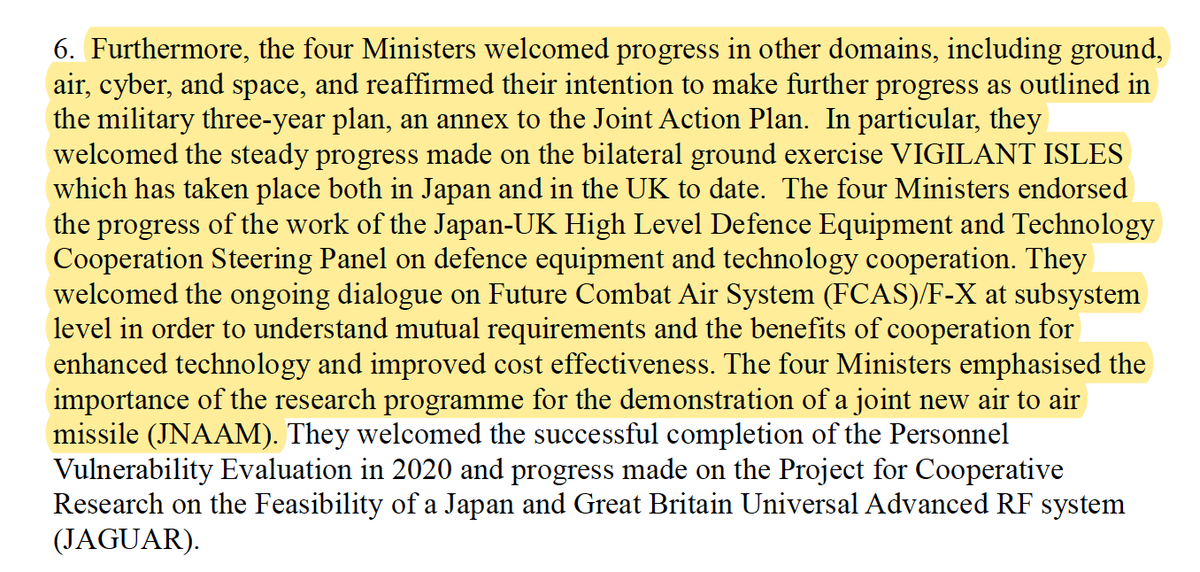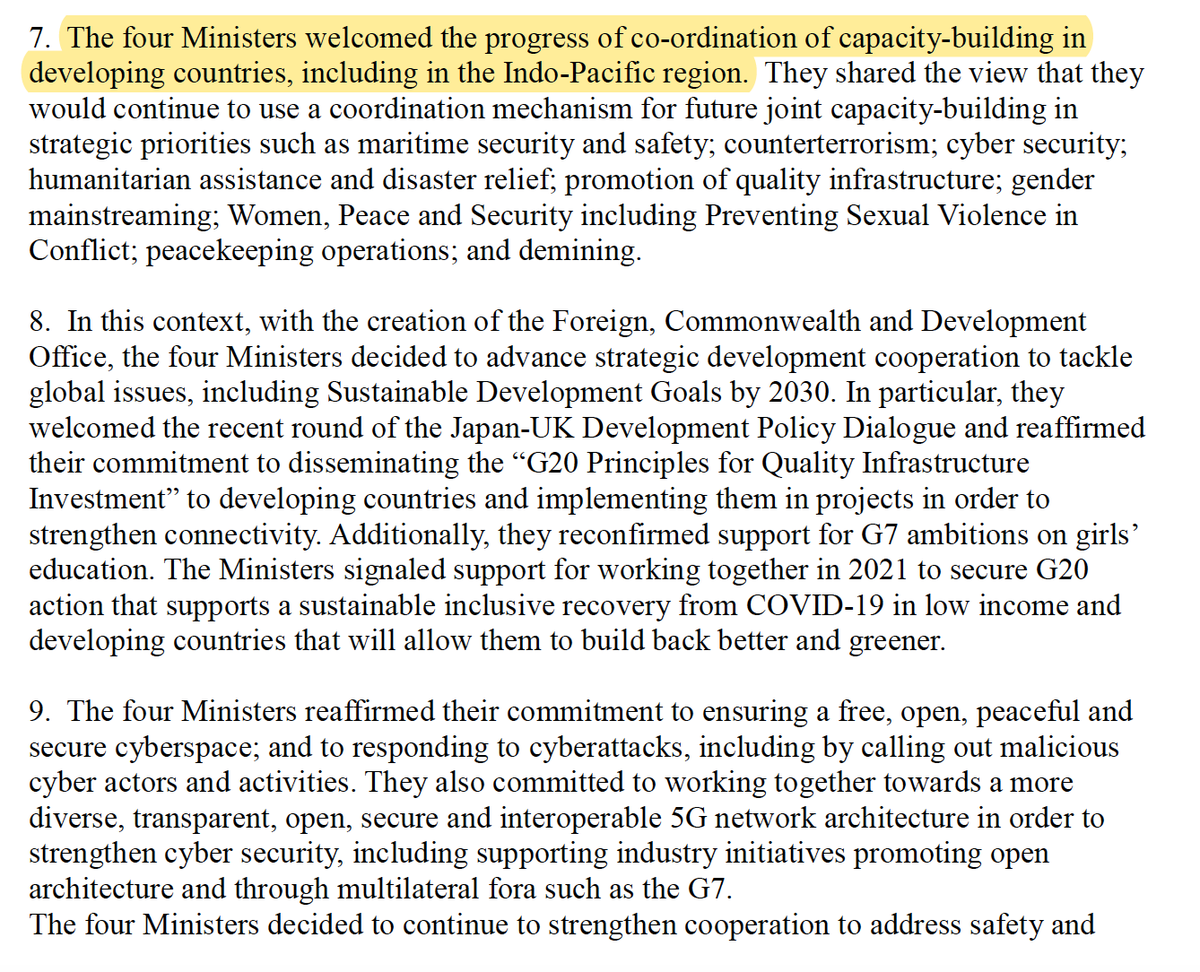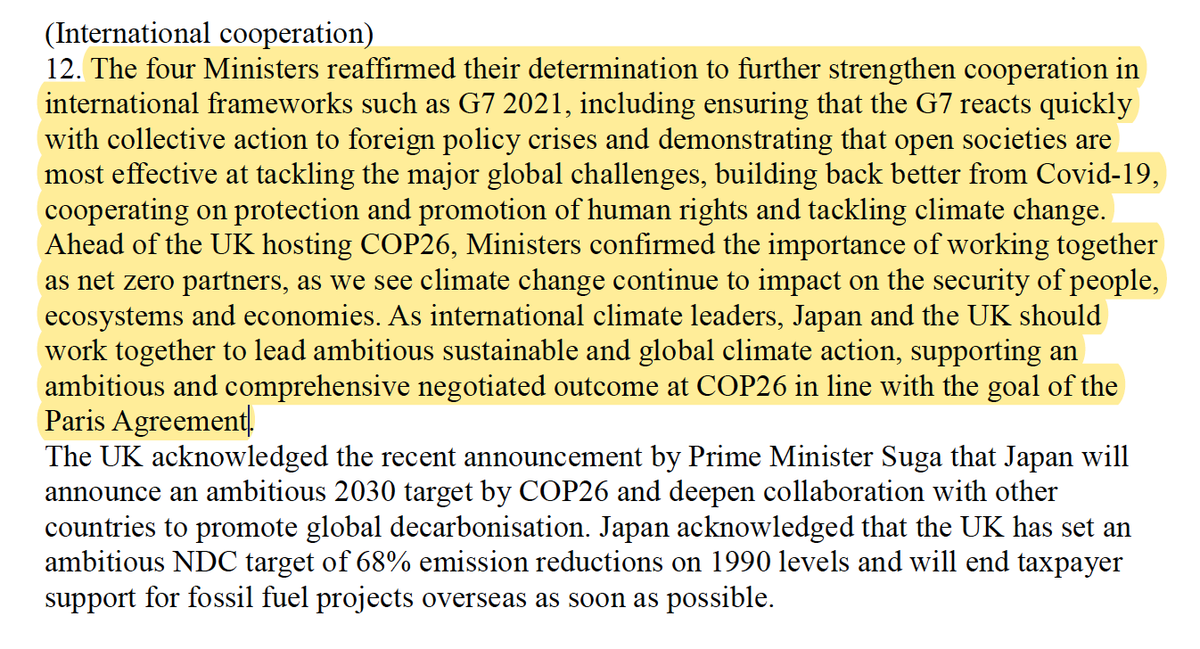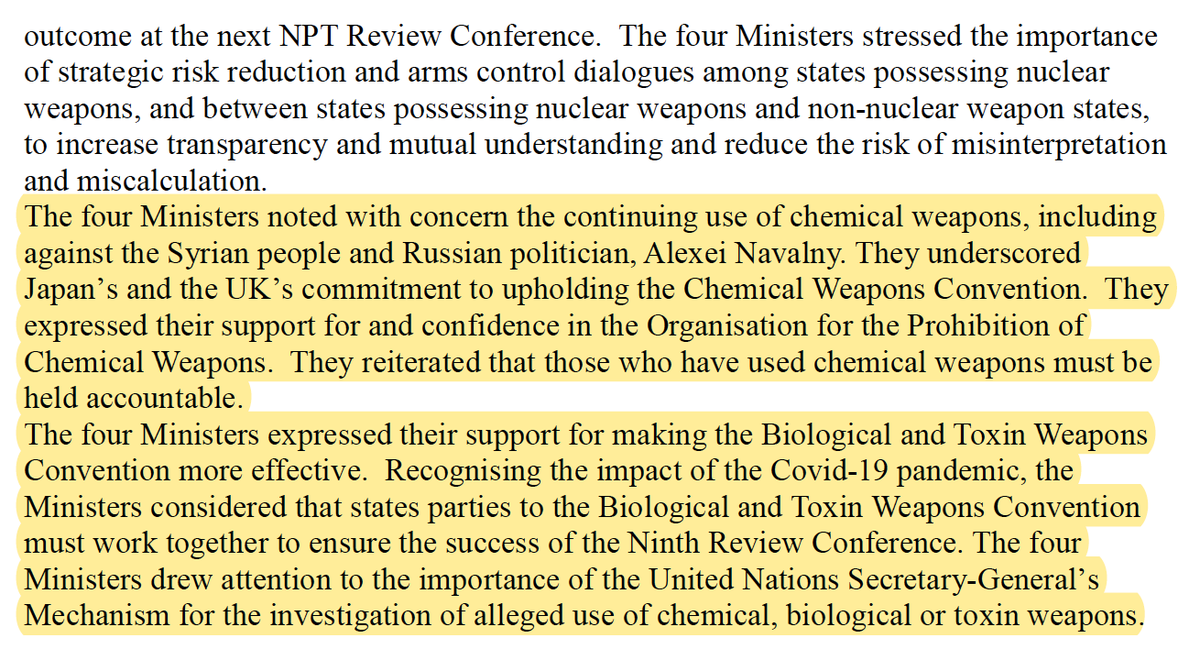Good morning Twitter. Yesterday it was a fruitful day and one with some interesting developments for those interested in UK Indo-Pacific matters, Anglo-Japanese ties, and dare I say the Integrated Review (IR) beyond usual complaints about risks and challenges of doing anything.
The UK-Jpn 2+2 took place virtually - as one would expect these days and the transcript of what was discussed/agreed is available here: https://www.gov.uk/government/publications/japan-uk-foreign-and-defence-ministerial-meeting-2021-joint-statement/japan-uk-foreign-and-defence-ministerial-meeting-2021-joint-statement
This is a thread reviewing the statement.
This is a thread reviewing the statement.
Right off the bat - para 2 - two important points to highlight:
1. Collaboration with like-minded patterns. In the ongoing debate over frameworks like Quad+, this suggests that both countries would be happy to see the UK involved;
1. Collaboration with like-minded patterns. In the ongoing debate over frameworks like Quad+, this suggests that both countries would be happy to see the UK involved;
2. CPTPP application. With Japan chair and Secretary Truss having confirmed that the UK application was in on Monday, this is promising indeed. Japan seemingly stands behind the UK in the process.
On Bilat cooperation - also kn own as the @alessionaval vindication paragraph :)
a. Maritime security remains a priority - and a commitment. interestingly, reference to the QEC deployment is in that context, which suggests maritime security covers from stability to deterrence;
a. Maritime security remains a priority - and a commitment. interestingly, reference to the QEC deployment is in that context, which suggests maritime security covers from stability to deterrence;
b. important to note the ambition to ‘elevate’ defence cooperation. This goes directly to those who continue to criticise the QEC deployment but never really engage with the core notion that this is first and foremost about taking defence cooperation to the next level;
c. Para 5 is the answer to the question of where is UK-Jpn def cooperation? Well, most weren’t paying attention but the development of the different layers required for a substantive relationship goes back at least to 2017 -under the May Gov, which included also curry tasting.
d. Para 6 further details how far one has gone - of particular note here is the intention of looking not just at practical ‘integration’, but also capabilities development. For Jpn security wonks: read diversification in addition to US alliance.
One of the most interesting aspects of the document is how and IP framework that places core values about international order- crucially openness - stand at the heart of a much wider agenda - which places well-known themes, eg connectivity, into a shared agenda on global issues.
This neatly leads to the next topic: international cooperation. Here, it will be interesting to see how G-7, COP 26, are being leveraged to mutually support the ‘shaping’ of international affairs in a way global issues help ‘constraining’ the potential challenges of revisionism.
In this respect - one longstanding point of ‘difficulty’ in the relationship concerned Russia. This statement is interesting as it offers clear steps to reconcile differences in behaviour - in a way perhaps that would have been difficult under PM Abe. A space to watch for sure.
On the other hand, the para on NATO rewards a trend that has been around for a while and that directly speaks to an argument I have made sometime ago on @RUSI_org here: https://www.tandfonline.com/doi/abs/10.1080/03071847.2016.1193356 - practical cooperation being a nice nudge there.
Last - but by no means least - international cooperation. This section is remarkable because of the substantive nature of the order of priorities:
a. East and South China Sea - especially how the stability of these theatres is linked to the use of force and normative behaviour;
a. East and South China Sea - especially how the stability of these theatres is linked to the use of force and normative behaviour;
b. Hong Kong and Xinjiang - taking the values question to the fore in a way that Japan in the past would have perhaps been less forthcoming;
c. DPRK, ASEAN, and what one could call the ‘conventional’ points of discussion.
c. DPRK, ASEAN, and what one could call the ‘conventional’ points of discussion.
What to make of all of this? If one is looking for signs of life in the Global Britain conversation - as informed observers like @b_judah do - this statement is a good place to start.
Since the beginning of the post-Brexit search for a new role, Japan has been a leading partner;
Since the beginning of the post-Brexit search for a new role, Japan has been a leading partner;
1. Trade, frameworks for cooperation, values, security, international profile: you name it. Japan has been the quiet force believing in what the UK can offer.
2. Japan is not the option of the last hour. It’s not part of ‘replacing Europe with something else’.
2. Japan is not the option of the last hour. It’s not part of ‘replacing Europe with something else’.
The development of ties goes back to 2017 and I’d stretch back to 2012 under Cameron.
3. In def/sec, this type of relationship is the space to watch and the one experts of the last 20 years of UK FP and security have proved unable to engage with. Maritime partnership is the game.
3. In def/sec, this type of relationship is the space to watch and the one experts of the last 20 years of UK FP and security have proved unable to engage with. Maritime partnership is the game.
I shall elaborate on this more over the next weeks - first port of call, next week @HJS_Org event organised by @RobertClark87 in which hopefully some of the carrier elements will be fleshed out. Before I sign off on this one final shameless moment of promotion.
The document states on line 2 of the first functional paragraph that the UK and Japan are both ‘maritime nations and actors in the Indo-Pacific’. In 2012, a very unknown young-ish scholar first explored what it means to be a maritime nation here: https://www.amazon.co.uk/Maritime-Strategy-National-Security-Britain/dp/1906876274/ref=sr_1_1?dchild=1&keywords=maritime+strategy+and+national+security+in+britain+and+japan&qid=1612437994&sr=8-1
Who knew then. And again, in 2019, the same - not slightly less unknown and defo less young scholar - moved on to argue the Indo-Pacific case for the UK, here: https://policyexchange.org.uk/wp-content/uploads/2019/07/UK-Defence-from-the-%E2%80%98Far-East%E2%80%99-to-the-%E2%80%98Indo-Pacific%E2%80%99.pdf and here: https://policyexchange.org.uk/wp-content/uploads/2019/03/Days-of-Future-Past.pdf
The rest - as they say - it’s history.
Hopefully lots in here of some use to @Rory_Medcalf @dicksamuelsMIT @RobertAlanWard @graham_euan @CoreyJWallace @JEyal_RUSI @MichitoTsuruoka @Yuichi_Hosoya @warstudies @KCLSecurity @KCL_CGS - thank you all for bearing with me on this thread
Hopefully lots in here of some use to @Rory_Medcalf @dicksamuelsMIT @RobertAlanWard @graham_euan @CoreyJWallace @JEyal_RUSI @MichitoTsuruoka @Yuichi_Hosoya @warstudies @KCLSecurity @KCL_CGS - thank you all for bearing with me on this thread

 Read on Twitter
Read on Twitter